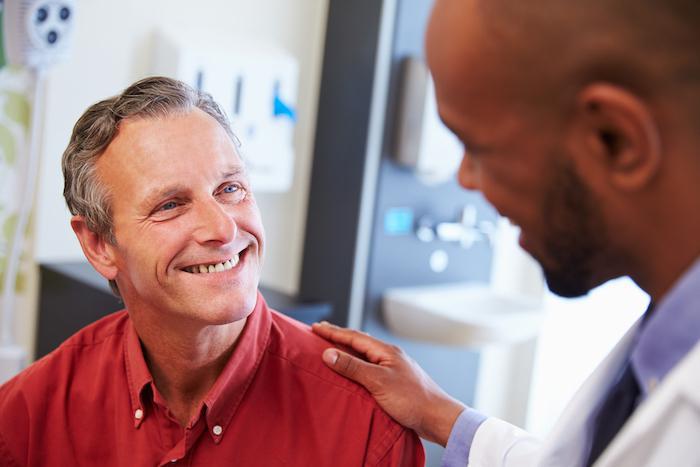D Are you worried that the signs and symptoms you feel are signs of prostate cancer? Let’s see if it is
According to the WHO, prostate cancer is a serious health condition that affects many men around the world. It is the second most common cancer among men and the fifth leading cause of cancer-related deaths globally. Prostate cancer can cause a range of symptoms, some of which may not appear until the disease has progressed to an advanced stage.
Early detection and treatment of prostate cancer can significantly improve a patient’s chances of survival, which is why it’s crucial to be aware of the signs and symptoms of the disease.
In this article, we’ll explore the top 10 signs and symptoms of prostate cancer, the causes, screening and diagnosis, treatment options, and prevention measures that will give you an inkling into how to detect if someone has this disease.
Ready?
Prostate cancer is a type of cancer that develops in the prostate gland, which is located below the bladder and in front of the rectum in men. The prostate gland is responsible for producing semen, and prostate cancer occur when cells in the gland grow uncontrollably.
As of September 2021, it was estimated that there were around 1.4 million new cases of prostate cancer worldwide, making it the second most common cancer among men according to the America Cancer Society. This is with the exclusion of the many cases that go undiagnosed and unreported.
Which Age Group is Prone to Prostate Cancer?
Prostate cancer is most commonly diagnosed in older men. According to Cancer.org, about 60% of cases which is about 6 in 10 cases are diagnosed in men aged 65 or older, and it is rare before age 40. The risk of developing prostate cancer increases significantly after age 50, and the average age at diagnosis is about 66.
However, younger men can also develop prostate cancer, particularly those with a family history of the disease. It’s important for all men to discuss their risk of prostate cancer with their healthcare provider and to consider screening options based on their age, family history, and other risk factors.
The exact cause of prostate cancer is unknown, but several factors can increase the risk of developing the disease, including age, family history, ethnicity, obesity, and exposure to certain chemicals.
Signs and Symptoms of Prostate Cancer
With medical observations and patterns of disease, it is easy to know whether or not you have prostate cancer. Keep in mind that this disease may be asymptomatic in the early stage as such it is recommended that you seek medical attention for further evaluation. According to Mayo Clinic, here are some of the medical proven signs and symptoms that can mean you have prostate cancer
-
Urinary Symptoms
One of the most common symptoms of prostate cancer is urinary problems. These can include difficulty starting or stopping urine flow, weak or interrupted urine flow, frequent urination, or a feeling of incomplete bladder emptying.
-
Sexual Symptoms
Prostate cancer can also cause sexual problems such as difficulty achieving or maintaining an erection, painful ejaculation, or decreased sexual desire.
-
Pain Symptoms
Pain in the lower back, hips or upper thighs can be a sign of advanced prostate cancer that has spread to other parts of the body.
-
Swelling Symptoms
Swelling in the legs or feet can be a sign of advanced prostate cancer that has spread to the lymph nodes.
-
Fatigue Symptoms
Fatigue or weakness can be a sign of advanced prostate cancer that has spread to other parts of the body.
-
Bowel Symptoms
Prostate cancer can cause bowel problems such as constipation, diarrhea, or rectal bleeding.
-
Blood in Urine or Semen
Blood in the urine or semen can be a sign of prostate cancer, but it can also be caused by other conditions such as an infection or inflammation.
It is important to note that these symptoms can also be caused by other conditions and do not necessarily indicate the presence of prostate cancer. If you are experiencing any of these symptoms, it is recommended that you discuss them with your healthcare provider for further evaluation and testing. Early detection and treatment of prostate cancer can significantly improve a patient’s prognosis and quality of life.
Screening and Diagnosis of Prostate Cancer
If you are experiencing any of the signs or symptoms, chances are that it may be prostate cancer or an infection. This can only be determined by a healthcare professional which involves you doing a screening test.
According to the Centers for Disease Control, screening for prostate cancer involves a blood test called the prostate-specific antigen (PSA) test and a digital rectal exam. If the results of these tests are abnormal, further testing such as a biopsy may be needed to confirm a diagnosis.
If confirmed present, the treatment for prostate cancer depends on the stage of the disease and may include surgery, radiation therapy, chemotherapy, hormone therapy, or a combination of these treatments.
As a rule, the higher the PSA level in the blood, the more likely a prostate problem is present. But many factors, such as age and race, can affect PSA levels. Some prostate glands make more PSA than others.
PSA levels also can be affected by—
- Certain medical procedures.
- Certain medications.
- An enlarged prostate.
- A prostate infection.
Because many factors can affect PSA levels, your doctor is the best person to interpret your PSA test results. If the PSA test is abnormal, your doctor may recommend a biopsy to find out if you have prostate cancer.
Prostate cancer can cause a variety of symptoms, but many men with early-stage prostate cancer may not experience any symptoms at all. Regular screening and early detection can improve the chances of successful treatment, so it’s important for men to discuss prostate cancer screening with their healthcare provider.
How do I reduce the risk of developing prostate cancer?
To reduce the risk of developing prostate cancer, men should maintain a healthy diet and exercise regularly. Early detection of prostate cancer can also improve the chances of successful treatment, so men over the age of 50 should discuss prostate cancer screening with their healthcare provider.
Do your elderly loved one need hearing aids? See this Guide on How to Get Free Hearing Aides for Older Adults In Indiana.





